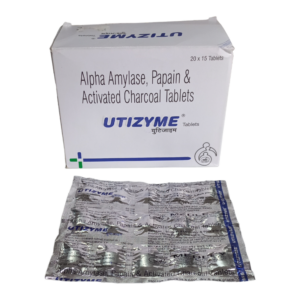ALPHA AMYLASE + PAPAIN + ACTIVATED CHARCOAL
Alpha Amylase: Alpha Amylase is an enzyme used as a medication to aid in the digestion of carbohydrates. It is commonly prescribed for individuals who have difficulty digesting starchy foods due to pancreatic enzyme deficiency, cystic fibrosis, or other digestive disorders.
The main mechanism of action of Alpha Amylase is the breakdown of complex carbohydrates into simpler sugars. This enzyme targets starch molecules in the food we eat and breaks them down into smaller units such as maltose, glucose, and dextrin. This facilitates the absorption of these sugars by the body.
The dose of Alpha Amylase depends on the individual’s condition and the severity of their digestive disorder. It is typically taken in the form of oral capsules or tablets, and the dosage may vary from person to person. It is important to follow the instructions given by the healthcare provider or pharmacist regarding the dosage and timing of administration.
Side effects of Alpha Amylase are generally rare but can include allergic reactions such as itching, rash, or swelling. Some individuals may also experience gastrointestinal issues such as diarrhea, stomach pain, or bloating. It is important to consult a healthcare professional if any adverse effects occur.
Before taking Alpha Amylase, it is crucial to inform your healthcare provider about any existing medical conditions, ongoing medications, allergies, or pregnancy/breastfeeding status. This will help prevent any potential drug interactions or complications.
In conclusion, Alpha Amylase is an enzyme medication used to aid in the digestion of carbohydrates. It works by breaking down complex starch molecules into simpler sugars. The dosage and side effects may vary from person to person, so it is important to follow the prescribed instructions and consult a healthcare professional if any concerns arise.
Papain: Drug: Papain
Use: Papain is a proteolytic enzyme derived from the papaya fruit. It is primarily used as a digestive aid and is commonly found in dietary supplements and over-the-counter medications.
Mechanism of action: Papain works by breaking down proteins into smaller peptides and amino acids. It helps in the digestion of proteins by increasing their solubility and facilitating their absorption in the gastrointestinal tract.
Dose: The recommended dose of papain varies depending on the specific product, its concentration, and the intended use. It is typically available in tablet or capsule form, with dosages ranging from 100 mg to 1000 mg. However, it is important to follow the instructions provided on the product label or as directed by a healthcare professional.
Side effects: Papain is generally considered safe when taken orally in recommended doses. However, some individuals may experience mild side effects, such as diarrhea, stomach upset, or allergic reactions. In rare cases, high doses or prolonged use of papain may lead to more severe side effects, including ulcers in the stomach or small intestine. It is advisable to consult a healthcare professional before using papain, especially if you have any pre-existing medical conditions or are taking other medications. Pregnant or breastfeeding women should also seek medical advice before using papain.
Activated Charcoal: Activated charcoal is a medication that is commonly used as an emergency treatment for poisonings or drug overdoses. It is a form of charcoal that has been treated to have small, low-volume pores that increase its surface area and make it more adsorbent.
The primary mechanism of action of activated charcoal is adsorption, which is a process of binding substances to its surface. When taken orally, it adsorbs toxic substances in the gastrointestinal tract, preventing their absorption into the bloodstream. This can help to reduce the toxicity of drugs or chemicals in cases of poisoning or overdose.
The appropriate dose of activated charcoal varies depending on the age and weight of the individual, as well as the specific circumstances of the poisoning. In general, a dose of 1 gram per kilogram of body weight is recommended. It is usually administered as a suspension in water and can be given either by mouth or through a nasogastric tube.
While activated charcoal is generally considered safe, it may cause some side effects. The most common side effects include black stools, nausea, vomiting, and diarrhea. These side effects are temporary and typically resolve once the treatment is discontinued. In rare cases, activated charcoal can lead to bowel blockage or aspiration pneumonia if it is accidentally inhaled into the lungs. It is important to use activated charcoal under the supervision of a healthcare professional to minimize the risk of complications.
It is worth noting that activated charcoal is not effective for certain substances, such as corrosive agents, alcohols, or metals. Additionally, it is not recommended for routine use in home poisoning incidents unless specifically instructed by a healthcare professional.
Overall, activated charcoal is a valuable medication for emergency treatment of poisonings and drug overdoses. It works by adsorbing toxic substances in the gastrointestinal tract and reducing their absorption into the bloodstream. Although it may cause some temporary side effects, it is generally considered safe and effective when used appropriately.

